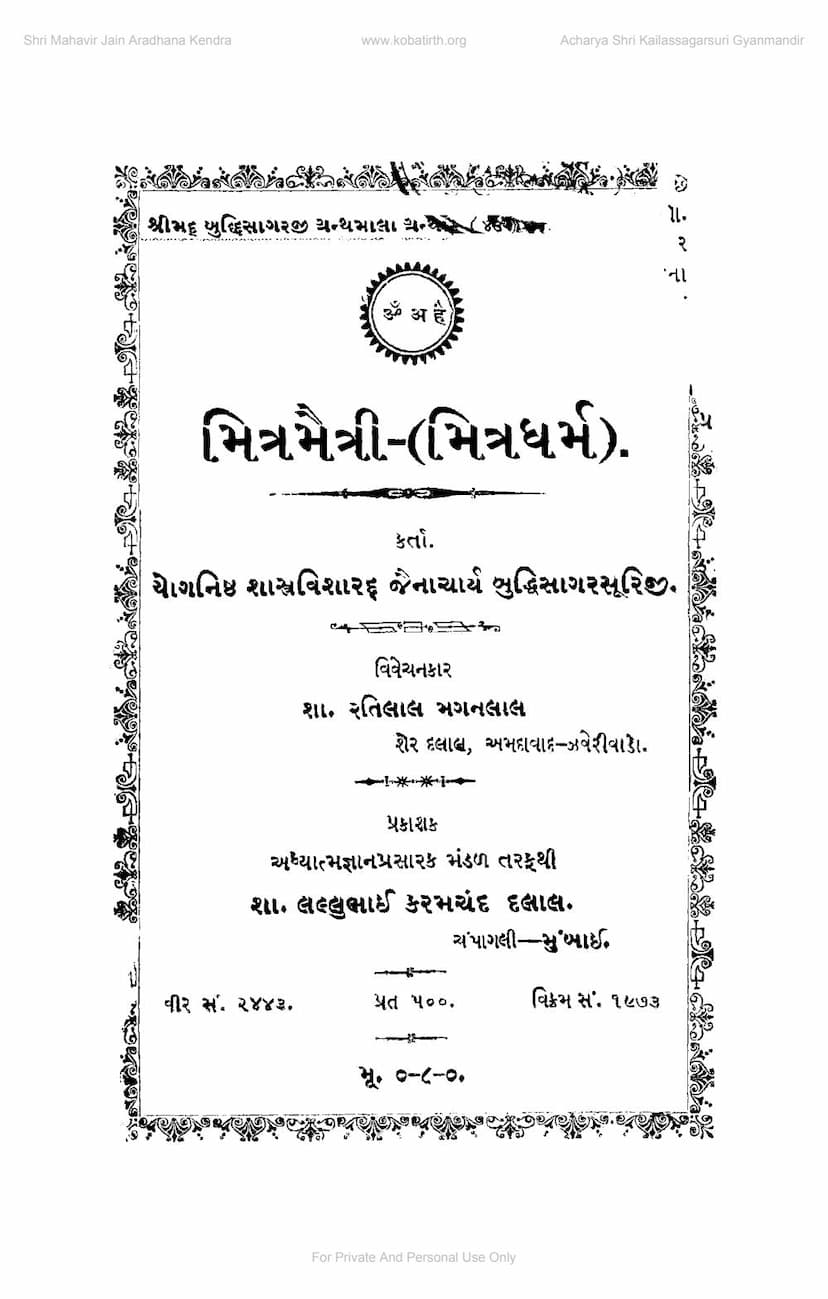Mitra Maitri
Added to library: September 2, 2025

Summary
The book "Mitra Maitri" (Friendship and the Duty of a Friend) by Acharya Buddhisagar Suriji, published by Adhyatma Gyan Prasarak Mandal, is a comprehensive guide to understanding and practicing true friendship according to Jain philosophy. The text, commented upon by Rati Lal Magan Lal, emphasizes the profound importance of friendship and the ethical principles that should govern it.
Key Themes and Concepts:
- The Essence of True Friendship: The book defines true friendship as a bond rooted in natural love, mutual understanding, and shared values. It distinguishes this from superficial or self-serving relationships, which are characterized by deceit, exploitation, and temporary alliances.
- Qualities of a True Friend: Acharya Buddhisagar outlines numerous qualities that constitute a good friend, including:
- Sincerity and Honesty: A true friend is honest in their words and actions, offering genuine advice even when it might be difficult to hear.
- Selflessness and Sacrifice: They are willing to put the friend's well-being above their own, even to the point of self-sacrifice.
- Empathy and Support: A true friend understands and shares in the friend's joys and sorrows, offering comfort and assistance during difficult times.
- Moral Guidance: They guide their friends away from wrongdoing and towards righteous paths, upholding principles of virtue and ethics.
- Trustworthiness and Loyalty: They keep secrets, maintain trust, and remain steadfast in their commitment, even in the face of adversity.
- Respect for Virtues: They appreciate and encourage the friend's good qualities while discreetly helping to overcome flaws.
- Upholding Promises: They are true to their word and fulfill their commitments.
- Fearlessness and Courage: They stand by their friends and principles, even in challenging situations.
- Characteristics of a False Friend (Kumitra): The text also details the negative traits of false friends, urging readers to avoid them. These include:
- Selfishness and Greed: Motivated by personal gain, wealth, or status.
- Deceit and Flattery: Speaking sweetly but harboring ill intentions or acting hypocritically.
- Gossip and Betrayal: Spreading rumors, revealing secrets, and backbiting.
- Envy and Jealousy: Resenting the friend's success and wishing for their downfall.
- Irritability and Anger: Being easily provoked and prone to outbursts.
- Lack of Understanding and Support: Failing to comprehend or assist during times of need.
- Unreliability and Instability: Changing loyalties or abandoning friends when circumstances change.
- Addiction and Immorality: Engaging in or encouraging vices that lead to spiritual and moral degradation.
- The Importance of Discernment: The book stresses the necessity of careful observation and evaluation before forming friendships. It advises testing potential friends through various situations to ascertain their true character.
- Spiritual Foundation of Friendship: The text subtly links true friendship to spiritual growth and adherence to Jain principles. It suggests that cultivating virtues like compassion, non-violence, truthfulness, and detachment fosters genuine and lasting friendships, leading to spiritual upliftment.
- Friendship as a Reflection of Self: The text implies that the friends we choose reflect our own inner nature and aspirations. By associating with virtuous individuals, one can elevate themselves, while association with the unvirtuous can lead to downfall.
Structure and Content:
The book likely presents these ideas through a series of verses (dohas) composed by Acharya Buddhisagar, each followed by detailed commentary and explanation by Rati Lal Magan Lal. The verses likely illustrate various aspects of friendship through allegories, examples from Jain scriptures, and practical advice. The narrative also includes a tribute to a departed friend, Dalukhbhai Maganlal, highlighting his virtuous qualities and his dedication to Jainism.
Overall Message:
"Mitra Maitri" serves as a timeless guide for cultivating meaningful and ethical friendships, emphasizing the transformative power of true companionship in both worldly and spiritual life. It encourages readers to be discerning in their choice of friends, to embody the qualities of a good friend themselves, and to recognize that genuine friendship is a precious spiritual asset.